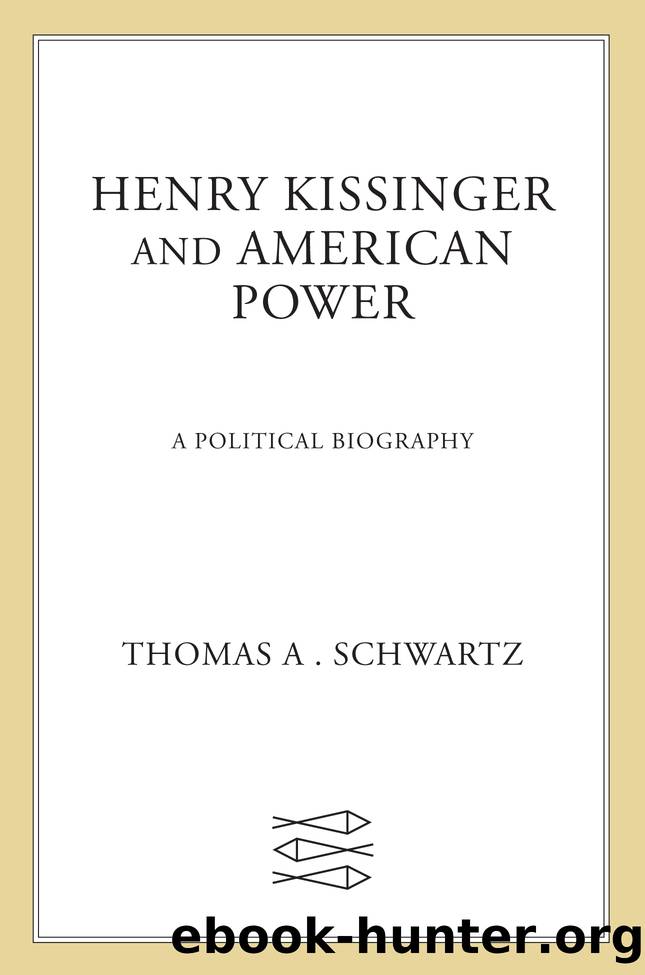Henry Kissinger and American Power by Thomas A. Schwartz

Author:Thomas A. Schwartz
Language: eng
Format: epub
Publisher: Farrar, Straus and Giroux
THE BITTER TASTE OF FAILURE: THE SINAI NEGOTIATIONS AND THE FALL OF SAIGON
On January 15, 1975, Gerald Ford began his first State of the Union address by telling Americans that the “State of the Union is not good.” The recession had thrown millions out of work, high oil prices aggravated inflation, and the federal budget deficit was growing at a record pace. Ford’s speech focused on domestic affairs, but toward the end, he praised the foreign policy of recent years and warned, “This is not a moment for the American people to turn inward.” Although he pledged to cooperate with Congress on foreign policy, he also insisted, “We cannot rigidly restrict in legislation the ability of the President to act.” Such congressional restrictions, Ford noted, even if “intended for the best motives and purposes, can have the opposite result, as we have seen most recently in our trade relations with the Soviet Union.”74 The gentle reference to the failure of the Jackson-Vanik measure reflected Ford’s restraint in dealing with Congress. Kissinger was much more critical. He told one interviewer that he thought “all the Western democracies at the present are suffering from a crisis of authority,” and his pessimism about the future of the American political system was one of the worst-kept secrets in Washington. Kissinger was hardly alone in his sentiments, as Watergate, the oil crisis, and the economic problems of the Western democracies occasioned widespread concern. The Trilateral Commission, a nongovernmental group founded by David Rockefeller to bring together leaders from the United States, Europe, and Japan, issued a report titled The Crisis of Democracy, which highlighted the problems of governing in the Western democracies.75
However, as common as these sentiments were in elite circles, Kissinger’s pessimism would become a political issue, and complicate matters for President Ford and his presidential campaign. A little over a week after Ford’s address, Kissinger spoke in Los Angeles, focusing on the need for a “new national partnership” in approaching foreign policy. The TV news coverage of his speech stressed his attack on “the growing tendency of Congress to legislate in detail the day-to-day or week-to-week conduct of our foreign affairs” and the threat that this “risks unraveling the entire fabric of our foreign policy.” Kissinger brought up both the Soviet trade deal and the restrictions on aid to Turkey. Marvin Kalb reviewed the speech sympathetically, but noted that Kissinger’s penchant for secrecy and his “elitist” practices had alienated many legislators. Congress now wanted more than a “hand-holding secretary of state.”76
In the environment of January 1975, Henry Kissinger needed a success, and resuming his step-by-step diplomacy in the Middle East might provide one. Americans saw the Middle East as both the most dangerous part of the world and the most vital for America’s economy.77 Ford did not take much convincing when Kissinger laid out the various scenarios for him, even when he told Ford, “The American Jews will oppose you in 1976, because they think you would move in 1977 and with a new party they would have a crack at a better deal.
Download
This site does not store any files on its server. We only index and link to content provided by other sites. Please contact the content providers to delete copyright contents if any and email us, we'll remove relevant links or contents immediately.
| Anthropology | Archaeology |
| Philosophy | Politics & Government |
| Social Sciences | Sociology |
| Women's Studies |
The Secret History by Donna Tartt(18208)
The Social Justice Warrior Handbook by Lisa De Pasquale(11957)
Thirteen Reasons Why by Jay Asher(8466)
This Is How You Lose Her by Junot Diaz(6455)
Weapons of Math Destruction by Cathy O'Neil(5843)
Zero to One by Peter Thiel(5503)
Beartown by Fredrik Backman(5369)
The Myth of the Strong Leader by Archie Brown(5244)
The Fire Next Time by James Baldwin(5025)
How Democracies Die by Steven Levitsky & Daniel Ziblatt(4966)
Promise Me, Dad by Joe Biden(4912)
Stone's Rules by Roger Stone(4867)
100 Deadly Skills by Clint Emerson(4696)
A Higher Loyalty: Truth, Lies, and Leadership by James Comey(4559)
Rise and Kill First by Ronen Bergman(4549)
Secrecy World by Jake Bernstein(4402)
The David Icke Guide to the Global Conspiracy (and how to end it) by David Icke(4386)
The Farm by Tom Rob Smith(4329)
The Doomsday Machine by Daniel Ellsberg(4250)
